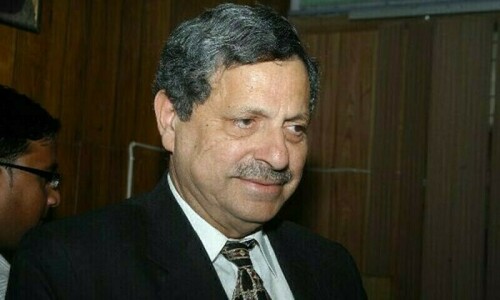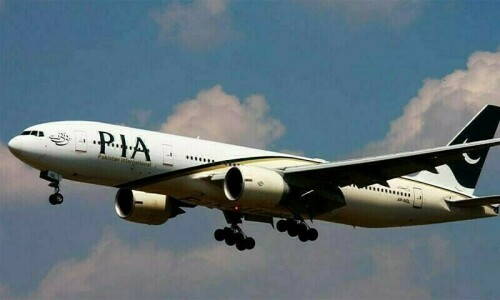PESHAWAR: Months of behind-the-curtain efforts to drive a wedge between Khan Said and the Mullah Fazlullah-led Tehreek-i-Taliban Pakistan are bearing fruit. Khan Said overcame his reluctance and bade adieu to a militant network that has wreaked havoc across the country. But what next?
Khan Said alias Sajna’s exit from the TTP had been in the works even before the start of now-doomed peace talks, but contrary to expectations what happened afterwards has made the militant scene in Pakistan more perplexed and complicated.
Militants now stand divided in geographical and ideological terms. Geographically, the so-called pro-government groups, Sajna included, now hold sway over the southern tip of the tribal region; North and South Waziristan.
Two such groups in the southern tip, of Commander Nazir and Hafiz Gul Bahadur, already have peace agreements, besides the not-so-hostile Punjabi Taliban. Sajna is expected to sign up soon, after the dust settles down and he vanquishes his weak rival, Shehryar Mehsud.
On the northern tip of this geographical divide is the entire lot of anti-government militant groups: Tehreek-i-Taliban Pakistan (Bajaur), TTP (Mohmand), TTP (Swat), TTP (Orakzai) and TTP (FR Peshawar).
Ideologically, the so-called pro-peace groups have made an effort to move away from their more radical former brothers in faith to embrace a more near-encompassing approach, signalling their aversion to bombing of shrines and targeting of mashaikhs.
This is in sharp contrast to the militants in the northern flank of the tribal region who have been bombing shrines and targeting religious figures from other sects. The division, analysts say, is along the Punjpeeri and Deobandi schools of thought. The Deobandis are holding sway in the south, the Punjapeeris in the north.
In ideological terms, say the analysts, it is more akin to the raging debate between Al Qaeda and the Islamic state in Iraq and the Levant, each accusing the other of deviating from the principles of Jihad.
Also, in geographical terms, with Sajna’s exit, the TTP which since its inception in December 2007 had been headquartered in South Waziristan and later North Waziristan, will now have to find itself a new place to hoist its flag. Where to? No one has a clue.
With much of the leadership of what remains of the TTP and its leadership sitting on the other side of the Durand Line, its headquarters and its several shuras would either have to be relocated to Afghanistan or to their fast-expanding new base in Khyber’s Tirah Valley.
Where does this leave Sajna and his fighters? He is gunning for Shehryar Mehsud and his men – the last obstacle to tighten his grip over the Mehsud hinterland. Shehryar – now the only Mehsud commander worth his name left in the TTP – is fast losing men and with them his options. He will either have to submit to Sajna or perish – the ruthless tribal reality.
Sajna’s revolt against the TTP has spawned three parallel militant command leaderships for Pakistan to deal with. Sajna, the unrivalled Mehsud commander in South Waziristan, with the largest number of fighters in tow; Hafiz Gul Bahadur, the most influential commander in North Waziristan; and the stridently anti-government and more ruthless Abdul Wali alias Umar Khalid Khurasani, who is fast overshadowing Mulla Fazlullah to emerge TTP’s de facto chief.
From the security establishment’s point of view, Khurasani is Hakeemullah in the making. With his network spread almost all over the country, including Karachi, Islamabad and Peshawar, Khurasani with the help of other hardliner groups presents today a more dangerous challenge to Pakistan than any other group.
Efforts are now under way to cobble together an alliance of Sajna, Gul Bahadur and Commander Nazeer Group in Wana led by Bahauddin. Sajna is already believed to have sent a message to Gul Bahadur to lead the campaign to rid North Waziristan of anti-state foreign and local militants to avert a possible military operation in the restive region.
Ironically, Sajna has the largest number of foreign fighters with him but they are believed to have little interest in Pakistan and want to fight the war against foreign forces in Afghanistan. Also, weighing in is Haji Sher Mohammad, the grandson of the legendary anti-British fighter, Mirza Ali Khan aka Faqir of Ipi. The word is that foreign fighters, mainly Uzbeks and TTP militants in Mirali and Miramshah, would be asked to either abide by local laws and live peacefully or leave the area.
The bombing runs over Mirali and Miramshah have already had an impact. Locals say most foreign fighters in Miramshah and Mirali have moved to the thickly afforested areas of Dattakhel and Shawal in North Waziristan, Lower Kurram, Upper Orakzai or their new redoubt in Tirah.
This leaves the Islamic Movement of Uzbekistan and there is no sign of them relinquishing their abode in Mirali. IMU statements chastising local tribesmen for hoisting Pakistani flags in Mirali following recent bombings and countering them with hoisting black flags makes it abundantly clear that they are in no mood to shift.
In the other hand, if assertions by government officials have anything to go by, Uzbek fighters seem to have teamed up with Khurasani’s TTM to unleash a series of terror attacks in the country.
The big question now is: will the government order military action in North Waziristan? As if the Washington’s pressure was not enough, Beijing too has joined the long queue of nations to demand action against its own brand of militants, they believe, are operating from safe havens of Waziristan. Considerable troops and assets have been deployed to carry out the job in Mirali and Miramshah and if some officials are to be believed a decision in principle has already been taken at the military level, the only wait is for the political leadership to blow the whistle.
But two things can pre-empt the action. One, the fast-approaching Ramazan due to begin later this month and there isn’t much time left to carry out and finish the job before that. So, if it doesn’t happen in the next few days, chances are, it may happen after Eid, that is, if the current spate of terrorist attacks continues and no new effort is undertaken to restart the stalled peace process with the northern fringe of militants’ bloc led by Fazlullah.
Second, the military commander in Peshawar has already given the Sher Mohammad-led jirga 15 days to try their luck and get Gul Bahadur to kick foreign militants out of North Waziristan. So any military action may have to wait, until at least June 21, unless of course the government reneges and go for action in the face of relentless attacks and mounting public pressure, Ramazan or no Ramazan.
As one senior security official put it: “If there ever was a moment when conditions were right for a military operation, when militants were isolated, weakened and in disarray and when the public support was right behind, it is this moment. If we are worried about blowback, then we have two options: either bleed slowly and die or get up and finish the job.”
“We have had several misses and false starts before but we can’t afford to lose this one,” he argued.
But the question is: Will Prime Minister Sharif oblige or procrastinate – as usual.
Published in Dawn, June 11th, 2014













































